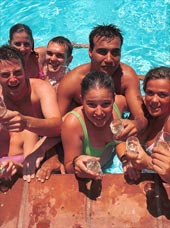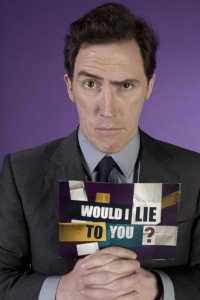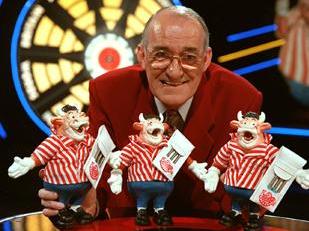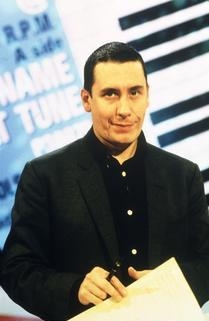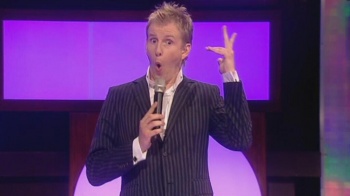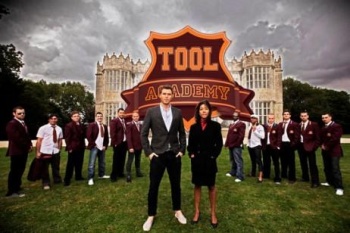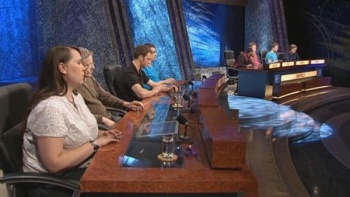Weaver's Week 2011-02-13
Last week | Weaver's Week Index | Next week
This week, we're finding the first University Challenge semi-finalist, looking for the queen of Mastermind, and paying particular attention to even the most insignificant of votes.
Stop! Hammer time.
Contents |
Tool Academy
Objective Productions for E4, 10pm Monday
Last year, twelve young men were entered into auditions for Britain's Ultimate Lad. In this game show, they would compete in such contests as Chatting Up a Bird, or Necking a Pint, or Lying at the Cops. Marks would be awarded for outlandish and outrageous behaviour, and the Lad with the most points would win the star prize.
At least, that's what they think. The truth is entirely different: Britain's Ultimate Lad was a complete fiction, a front for the real show, though that's not going to stop it from appearing on Channel 5 later in the year. Tool Academy is about taking lads who will flirt, booze, and fib their way into trouble, and trying to get them to change their ways. And they'll do it on national television, for the entertainment of the viewing public.
At this juncture, we have to stop and point something out to our fellow bloggers. Tool Academy takes its name from a slang term for the male member. It is most certainly not, with more careful enunciation than Jeremy Paxman, a show looking to find Britain's biggest cut. We're not going to spell out the difference, but trust us, there's a difference.
Now then, what actually happens on Tool Academy? One of the contestants leaves the programme within a few hours of the producers' deception being exposed, and that's probably par for the course. The others will, over the course of some days and weeks, engage in what can only be described as relationship counselling with their significant others. It's worth noting that all the significant others in this programme were female, perhaps suggesting that the behaviour displayed by the "lads" is somehow validating their heterosexuality.
What's certainly being validated is the television career of Sandra Scott, one of the psychologists on Big Brother, back in the day when Big Brother was a scientific experiment and employed psychologists in front of the camera. Indeed, back in the day when Big Brother was played in front of the camera. Each week, she will conduct some exercises with the contestants, and with their companions, and form an assessment of how well they have fared. Only the progress of the men will be judged, they are competing as individuals and not as couples.
In the first programme, for instance, the chosen technique was a public display of polygraphary. No, that's not the phenomenon of one man snogging two women at once, but what's commonly known as a "lie detector". Scientifically speaking, this is a load of baloney, as the polygraph is, itself, a fib.
A polygraph will measure the subject's heartbeat, breathing rate, blood pressure, and perspiration while he is being asked a series of questions that fall into specific categories. One is the irrelevant question, designed to baffle the subject, and help him to lose track of other questions. There are control questions, such ideas as: "Have you ever told a lie to get you out of trouble?" The assumption is that anyone telling the truth will answer "yes", but that the discussion will make him uncomfortable and elicit physical reactions. These reactions are compared to the serious questions (in this case, "Have you ever cheated on your girlfriend?").
If the testee scores a greater reaction to the control questions, the subject is held to have told the truth on the relevant questions; if the latter are greater, he's not told the truth. A tie is possible if responses to both control and relevant questions are about the same.
The only problem with all this is that it's entirely subjective, and the process is built on a false assumption. Subjects who answer the control questions honestly will put themselves under less stress, and be more likely to produce a measurable response to the real test questions. Liars can beat the measurer by altering their physiological responses to easier questions – think exciting thoughts, do mental arithmetic, bite one's own tongue. Peer-reviewed research suggests that polygraph operators can't detect these techniques, and the whole process is of entertainment value only.
This is, perhaps, acceptable on a low-stakes entertainment show, when it's done strictly for giggles. This column can find no evidence that polygraphs have any scientific validity at all, and doesn't think that they can be used to provide worthwhile evidence. Yet Tool Academy uses this woo as one of its first criteria for elimination. We're seriously unimpressed, it's the equivalent of treating serious illnesses by the application of leeches.
We've gone into some detail about this misgiving for one very good reason. Tool Academy only works as televised relationship therapy if the judgements of the psychologist are credible. Once it becomes clear that Sandra Scott's clinical accuracy is not the main judging criterion, we have to assess the programme as an entertainment, one that already lies, deceives, and manipulates both its contestants and audience.
There are many other things wrong with Tool Academy. The contestants are given short nicknames, purportedly to summarise their character in one word. Like "Posh Tool" or "Scary Tool", they're nicknames that bear little resemblance to their personality. And the humiliation continues. The contestants are ordered to dress in ill-fitting blazers, like third-formers who would rather not be in school. And rather than employ a voice-over person, they get the contestants to do the job themselves, in retrospective.
Though it wasn't noted in the pre-launch publicity, Tool Academy is imported from the USA. It shows: the programme follows their tedious narrative convention of preferring amateur contestants to professional voice-overs, and it follows their societal convention of pretending to help people while actually sneering at them. Rejecting actual clinical judgement in favour of pseudo-science, that's another imported trend.
At the end of the episode, the psychologist and host have worked out which of their contestants have progressed well, and which is most in need of their help. So, what are they going to do with this person at the bottom of the class? Give him extra lessons to bring him up to catch up with the rest of the group? Er, no, they're going to sling him out on his ear. He won't be entitled to claim the £25,000 prize, and congratulations from host Rick Edwards. Whoever he is.
It's at this point that the purpose of Tool Academy becomes clear. It's not to educate viewers in how to progress a relationship. No, the aim of the show is to laugh at the ridiculous fools, to sneer at these lower life-forms, to give the viewer a sense of moral superiority. Each show finishes with the evictee begging his companion to take him back. This act of forgiveness, apparently, is the emotional climax of the programme, and is billed as an act of female empowerment. As with Take Me Out, we completely miss how this helps the women, it looks and feels sexist.
At times, it feels as though this programme was made purely to wind up bien-pensant critics, which probably includes this column. Have we been trolled?
University Challenge
Deci-final 5: Oxford Brookes v Sheffield
Oxford Brookes won their first deci-final match, beating Christ's College Cambridge by 185-160. Sheffield also had a narrow win last time out, emerging ahead of Magdalen Oxford by 230-225. Will it be all white on the night? That's the first starter, picked up by Sheffield; they go on to pick up bonuses on clubs and on piano instructions, and a starter on "Who's Afraid of Virginia Woolf". A throwback to Literary Gladiators, there.
Does anyone understand that question about internal reflection? Thought not. Oxford Brookes get going with members of a secret society, and maths power sequences. Word clouds of famous political speeches form the first visual round, and it's name the politician from the set of words. Sheffield's already established a 70-20 lead, and it extends with this week's Little Billy Shakespeare question, on jewellery in his plays. The Steelmen continue to run up their lead, until Oxford Brooks have a Talk Like a Pirate answer, saying "Arrr". Their reward is three on quantum physics, which is unfortunate. The audio round's on the Songs of Bacharach and David, on which Sheffield are world experts, and it takes their lead to 150-25.
Are we going for the biggest comeback in history? Oxford Brookes are going to try: they begin with mammon, remember that Ely was on an island, and it briefly sounds as though they're going to get a starter on a remarkable cricketer. But the answer's wrong, Sheffield pick up the question and achieve perfection on the bonuses about glaciation, and it's very difficult to see them losing from here. Oxford Brookes have to interrupt on a question about either Lerner or Loewe, and go for the wrong man. It's just not their night, is it. More Little Billy in the visual round, paintings of ghosts in Shakespeare plays, and Sheffield's lead is 215-35.
Kings using their royal prerogative to over-ride the parliamentarians gives Oxford Brookes a few more points, and then capital gains tax helps them out. The side briefly considers that some poor person was named Eastbourne Smith, but that's not quite right. Sheffield pick up the baton with etiology – the sources of diseases – but Oxford Brookes get sum more points with the answer "sum". When asked for a fruit, they guess the tangelo, Richard Whiteley's favourite. It's now entirely clear that Sheffield will win, but Oxford Brookes move into triple figures with knowledge of Caribbean and Irish geography. The final score is a convincing win for Sheffield, 265-135.
Andy Bolton was best on the buzzer for Sheffield, five starters, but everyone got two, and the team was right in 25/42 bonuses. For Oxford Brookes, everyone got two starters, threr were three missignals, and 14/24 bonuses were answered correctly. The overall accuracy rate was thus 61/93.
Next match: Christ's Cambridge v Magdalen Oxford
Mastermind
Heat 22
James Collenette is tapping his pen from the sidelines, his score of 29 (2) could see him progress as a high-scoring runner-up.
Steve Upstone is our first contender, and he's been listening to Richard Thompson (b 1949). The subject is a singer-songwriter-guitarist, who played with Fairport Convention before beginning a solo career, including the highlight album Rumour and Sigh. He continues to write and play to this day, and was nominated for an award at the NARAS ceremony last year. The final score is a very competitive 16 (1).
Leslie Hurn has been watching the Life and Films of Ray Harryhausen (b 1920). Harryhausen's speciality was stop-motion animation – he would make scale models, take a picture, move them infinitesimally, take another shot, and eventually make a film. He's perhaps best remembered for his work on Jason and the Argonauts (1963). The round goes well, finishing on 12 (2).
According to the pre-publicity, Helen Walkling has been reading Stephen King (b 1947), a writer of horror fiction. This will have come as a major surprise to the contender, who has actually said she wanted to answer questions on King Stephen (reigned 1135-54). Anarchy! Confusion! "Jammy" – The Hitch-Hiker's Guide to the Galaxy. It's a good job she got the right set of questions, finishing on 14 (0).
Max Cooter spent his revision time watching the Plays of Shakespeare (1564-1616). "Little Billy" was already an established playwright on the London stage when it was closed in 1593 by the plague, and he went on to be the regular author for the Globe theatre. His best-known works include Titus Andronicus, King John, and Timon of Athens; almost 400 years after his death, Shakespeare is the single defining British cultural force, studied by reluctant students. It's a traditional Mastermind subject, and perhaps one a little too large for the first round, so the final score is 6 (3).
Mr. Cooter is quickly back amongst us, remembering one of the feats of Graham Swan, and the Oedipus Complex, and the French queen who trod on her executioner's foot. In fact, there are a heck of a lot of correct answers in this round, perhaps the contender was able to relax and go hell-for-leather in the second round. His final score is 22 (8), and we hope he comes back with a slightly smaller subject, because he'll be dangerous next time.
Mr. Hurn remembers the walkabout and the Blaydon races, and The Saint and the former name for Surinam. He also remembers the hosts of Eggheads, ensuring he won't get beaten up by Tim Vine's Brother round the back of the schedule. Corkscrews and ABBA help lift his score to 26 (4). Might be enough. Possibly.
Helen Walkling kicks off with a gander and some types of star, and has to think about which country Oman is the capital of. Oh, it's "Amman", the host's enunciation isn't as good as it might be, so Jordan. She has the misfortune to confuse the titles of Dr. Jeykll and Mr. Hyde, and mixes up Areas of Outstanding Natural Beauty with World Heritage Sites. It's close, but no cigar, finishing on 24 (3).
Mr. Upstone finishes off the programme tonight, and he's a-quiver with the opening question. He also remembers the Special Boat Service, with a motto even better than "Who Dares Wins". The contender responds promptly and crisply, either giving the correct answer or passing. As the round progresses, it's clear he's passing more and answering less, not even remembering that Jack Dee won Celebrity Big Brother (not that Mr. Dee cares to be reminded of this fact) and when the time expires, his score has reached 25 (13).
So Leslie Hurn from Norwich progresses to the semi-finals, where he's joined by James Collenette.
This Week And Next
We regret to report the death of Bill Justice, the Disney animator who created Bambi and his friend Thumper. Our University Challenge recaps would be far less entertaining without his inspiration.
Another fortnight, another OFCOM report. The latest edition contains a salutory note about the importance of running a free and fair election. Even if you're running the most informal of votes, where you ask listeners to send in their response to a song and determine which they preferred, you've got to be honest in your dealings. Soliciting responses on a premium-rate SMS number, and subsequently cancelling the vote, is unfair on the audience. That's what happened on Kerrang Radio last November, and neither the feature nor the broadcaster has appeared since.
As we intimated last week, the people of Ireland have voted for their Eurovision competitors, and they chose for Jedward to go to Dusseldorf. We heard an interview with the competitors on Saturday morning – well, it was billed as an interview, but all we understood was the questions and a high-pitched noise. Sounds like they still haven't silenced the fire alarm, then. As for the song, it's high-energy disco with a thumping bassline and a catchy hook. This explains why Jedward have entered for Ireland, as the BBC would never put forward anything a mere year behind the fashion.
Ratings for the week to 30 January are out, and show that Dancing on Ice is losing it. The fourth performance show attracted barely 8m viewers, and In It to Win It inched up to 6.7m. The Magicians bowed out with 5.9m, comfortably ahead of Take Me Out on 4.3m. The Biggest Loser looks to have stabilised at 3.9m spectators. University Challenge was seen by 2.9m, and Come Dine With Me only just beat The Million Pound Drop Live, both on 2.4m. Perfection makes the BBC2 top thirty, 1.7m saw Friday's show.
There's a surprise in the digital channel charts. Not with Got to Dance at the top – 1.33m saw the show – but with Tool Academy in second place. We know it's on after Glee, and there's not much else on Monday evenings, but 780,000 people? That's E4's biggest game show performance since the end of Celebrity Big Brother a year earlier, and the second-best rated game show in the channel's ten year history. Why is this so popular? Please say it's Glee causing viewers to fall asleep. ITV-HD's Dancing on Ice comes in third with 680,000 viewers, while ITV2's imported versions of Pop Idle and Hell's Kitchen both score 640,000.
It's Nick Knowles Week on the BBC. As well as last night's Secret Fortune, and the ongoing Perfection (BBC2, 4.30 weekdays, except Wales), he's appearing on A Question of Sport (BBC1, Monday evening). By then, we'll know the new champion of Brain of Britain (Radio 4, 1.30 Monday), and have started Trade Your Way to the USA (CBBC, 4.30 weekdays). There's a new round of Masterchef Goes Large (BBC1, 9pm Wednesday), and Radio 4 says It's Your Round (11pm Thursday). Talented Welsh youngsters perform on Sawl Seren? (S4C, 4.20 Friday), and untalented entertainers appear on Let's Dance for Comic Relief (BBC1, 7pm Saturday).
To have Weaver's Week emailed to you on publication day, receive our exclusive TV roundup of the game shows in the week ahead, and chat to other ukgameshows.com readers, sign up to our Yahoo! Group.

